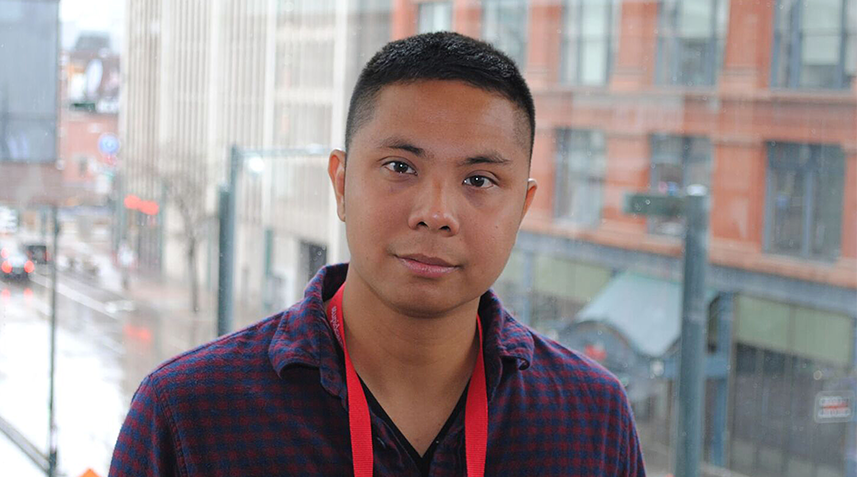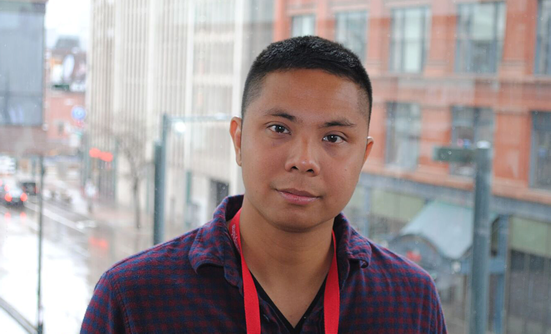
I came to the United States in 2013, never thinking I’d be homeless, have to move across the country to a city where I didn’t know anyone, and get cancer—twice.
After graduating with a nursing degree in the Philippines, I came to the United States in 2013 and enrolled at Tidewater Community College in Virginia Beach. I had to finish some classes there to become a registered nurse in the United States. I really wanted to be an army nurse, so I was training hard, prepping physically for life in the army.
As If I Were Drowning
About a year later, I started having shoulder pains that I attributed to working out too hard. The pain progressed to chest pain; I’d get winded after running only 1 mile. I continued to ignore the symptoms until the night my roommate called 911. I was gasping for air in my sleep, as if I were drowning.
The paramedics wanted to rush me to the hospital, but I didn’t want to pay ambulance fees, so I went to the clinic the next day. Because of the chest pains, I kept thinking it was a heart condition, which my mother had. When the ECG came back clear, things didn’t add up, but cancer was the farthest thing from my mind.
Not a Heart Condition
Half my chest was blocked, which, according to the CT I had later, was shown to be a grapefruit-sized tumor. The doctor said I had either pneumonia or the “big C.”
I had a biopsy the next day. Then another doctor came in to talk with me before the biopsy; when I saw the word “Oncology” written across his coat, I fought to keep every Grey’s Anatomy cancer episode out of my head and said to myself, “This can’t be happening.”
A week later I was diagnosed with stage II non-Hodgkin lymphoma (NHL), subtype primary mediastinal large B-cell lymphoma. Every 3 weeks I was receiving 6 cycles of Rituxan (rituximab) plus the drug regimen known as CHOP (cyclophosphamide, doxorubicin, vincristine, and prednisone). I usually felt bad for the first 2 days, with constipation, fatigue, having no taste, and neutropenia (low white blood cells that fight infection). Once my appetite came back I’d immediately feel better, and I could start eating normally again.
Pushing Through
The first go-round, I viewed cancer as a roadblock I could work around. Even though I stopped going to school, I still did my home nursing jobs. I wanted to be busy, not a patient with cancer. My mom came from the Philippines, and she kept telling me to take it easy. I didn’t care—I wanted a routine, and my daily life. I downplayed the severity of the illness.
Once the treatment was over, all my emotions bubbled up to the surface. I was no longer in a survival mode nor in deep denial, so I Googled “support groups” and found 2 to check out. I was the youngest person, by far, in both groups. One group wasn’t helpful, but in the second group, I made friends with an 8-time survivor in her 70s who was an oncology nurse, and she helped me through those difficult times.
Withdrawing After Relapse
A few months later, the cancer relapsed, which sent me into a panic. It finally hit me that I could die from cancer. I stopped forging ahead, and I became withdrawn and sad. Just months after re-enrolling in school, I had to withdraw from all my classes.
The idea of a stem-cell transplant—the blood transfusions and high-dose chemo—really scared me. I even contemplated not doing the transplant and going back to the Philippines to wait it out.
I might have opted to forego treatment if it weren’t for my English teacher, Tricia Swoope, at Tidewater Community College. An hour after I sent the e-mail to my teachers letting them know I had to withdraw from class because my cancer had come back, she called to tell me she wanted to do a fundraiser. Even though she didn’t really know me, she was compelled to help me out.
Teaching Hope
That was a huge turning point, when the tiny little voice in my head said, “You need to fight again.” Unlike after my first diagnosis, I actively reached out for peer support. I joined an online NHL Facebook support group and talked to a girl about my age who had gone through a transplant a few months before, and she explained the process. She soothed my fears and made me feel I could get through it.
My oncologist said I had to get treatment at a Comprehensive Cancer Center for the relapse. I asked him if there was a center in Texas; I wanted to be close to my brother, who lived in Dallas. A month later, I uprooted my life in Virginia and moved to Houston to receive treatment at M.D. Anderson Cancer Center.
Friends in Virginia kept telling me I’d be okay. I didn’t know what to say. I didn’t feel like I was going to be okay—knowing I faced a long road of treatment. I remember sobbing behind my sunglasses on the flight to Houston, contemplating the treatment side effects I’d experience.
Side Effects and Stem-Cell Transplant
The treatment for the cancer relapse was rough. First, I received Rituxan plus a different chemotherapy regimen at the hospital for 3 weeks. The side effects were similar to the Rituxan plus CHOP regimen, but it took longer to recover. My blood cell counts would drastically drop after each cycle to the point where I needed blood transfusions every time. Then I had an autologous stem-cell transplant, followed by 3 weeks of recovery in the hospital.
This was the most difficult time in my life. All the previous chemo treatments didn’t come close to this experience. I lost every strand of hair on my body. In the first few days following the procedure, I had severe diarrhea and neutropenia; I needed a blood transfusion for the first 7 days after chemo, just to keep my immune system afloat.
I had severe nausea and vomiting every day for 2 months, as well as mucositis, hyperpigmentation, and, after a few weeks, the skin on my palms and soles started peeling off. I was so weak after I was discharged, I needed 2 naps a day to get through the day for the first 2 months. Once I recovered, I had 20 rounds of consolidation radiation therapy, which weren’t too bad—just a sore throat and skin irritation.
Fighting Alone
I knew no one in Houston. That first week at M.D. Anderson was one of the hardest weeks. I’d never felt so alone and helpless. My brother came from Dallas to pick me up from the airport and went with me to the first appointment, but then he had to leave, and I was alone, dealing with cancer. It was hard. A few weeks later, my older brother came from the Philippines to help take care of me.
I didn’t have time to find housing. The tumor had doubled in size in 1 month, and the doctors wanted to start treatment immediately. Without a home, I stayed in free housing for patients with cancer at Dan’s House of Hope. During treatment, I bounced from there to another place and back, because of the limits on how long a person can stay there. I don’t know what I would have done without a free place to stay.
Finding and Giving Support
At M.D. Anderson, I joined a young adult support group and became close with many patients. It can be hard to relate to people outside of the cancer community who don’t get this experience. Everyone has challenges, but when people try to compare theirs to going through cancer, I think, “I’d love to have their problems.”
Despite the peer support, I was anxious about a recurrence. Before the relapse, I had experienced chest discomfort that my oncologist brushed off, saying I had only a 5% chance of relapsing. I’m glad I had my primary care physician order a CT scan, which showed I had a new tumor in my chest. Any time after the stem-cell transplant, when I had chest discomfort, I didn’t hesitate to ask for a scan to calm my worries.
I’ve since made many friends in the cancer community, people who are still in treatment, newly diagnosed, or are in remission. Because of the support I received that got me to where I am now, I feel responsible to pay it forward. I try my best to support others through their treatment, and I know things that can help going through cancer, such as any emotion you have is valid. There’s no guidebook about how you’re supposed to feel or respond.
Regaining My Life
In addition to helping other people get their footing, I’m trying to regain my own life. Cancer took 18 months of my life I can never get back. My life was put on pause. I’m 2 years after transplant, and I’m just starting to feel that maybe I won’t get sick again, and that I can truly move on with my life.
My goal now is to become an oncology nurse, to offer the knowledge and experience I gained as a patient. I’m working on getting my registered nursing license in Texas. The lost time made me work harder, and I’m a lot more resilient now.
The doctors, the chemo, and the radiation may cure the cancer, but it’s finding the community you can belong to that heals you.





